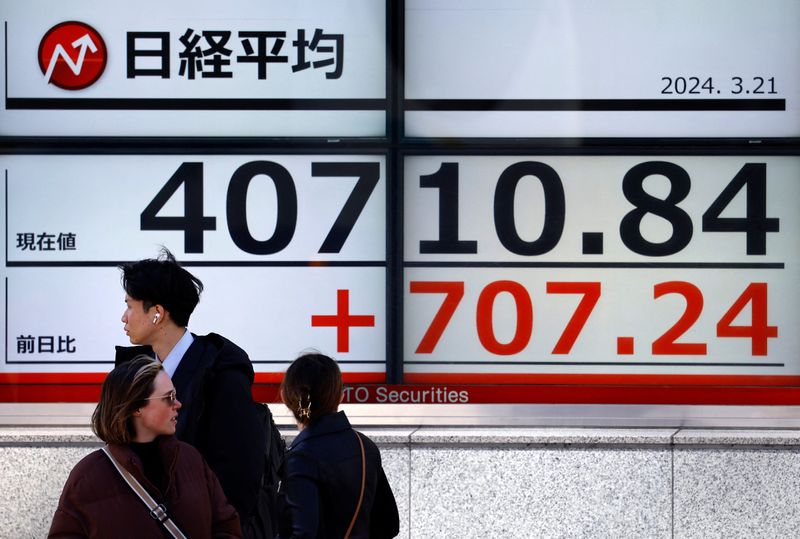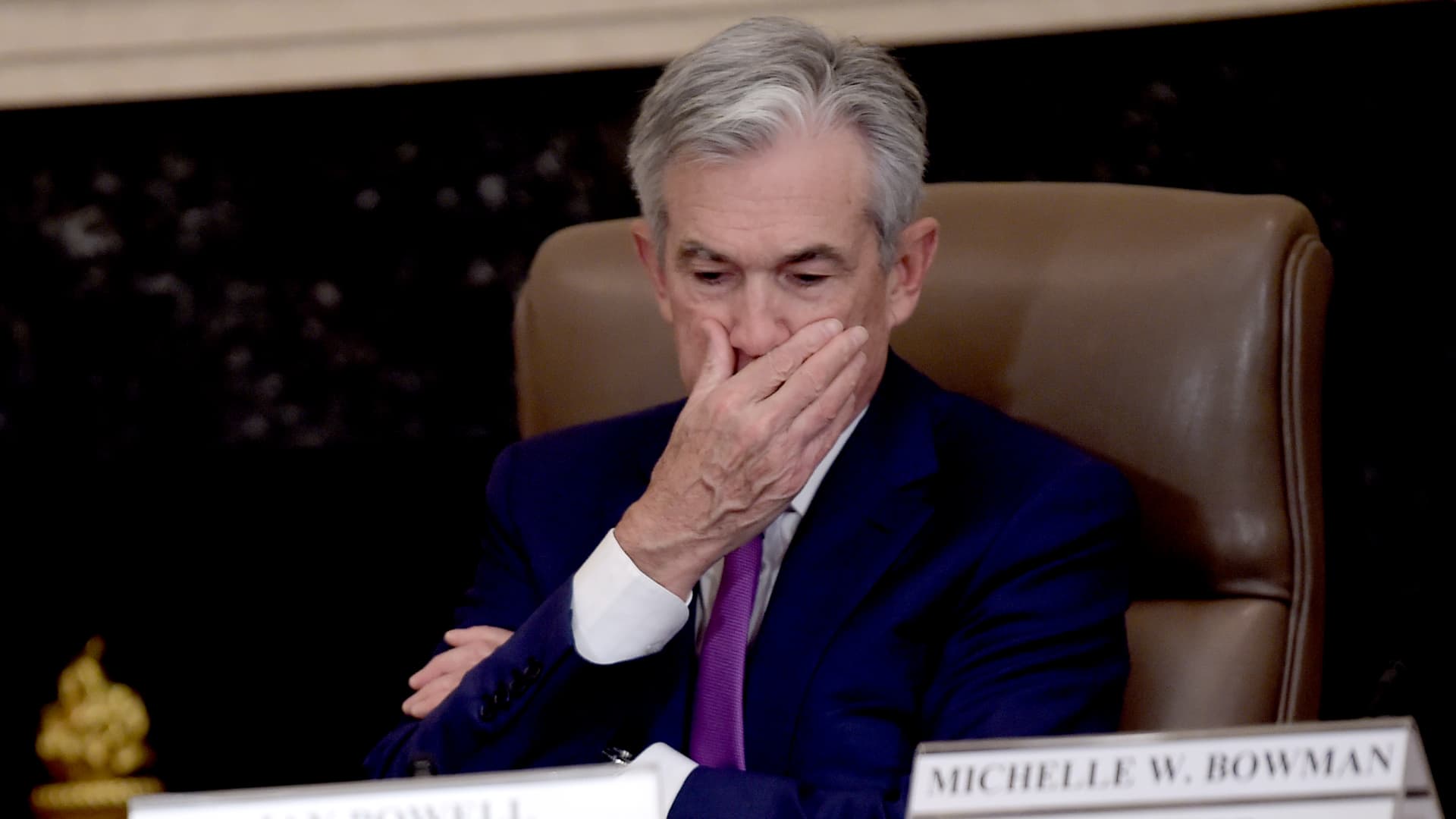[ad_1]

© Reuters. Passersby stroll in entrance of an electrical display displaying Japan’s Nikkei share common outdoors a brokerage in Tokyo, Japan March 21, 2024. REUTERS/Issei Kato
By Rae Wee
SINGAPORE (Reuters) -The yuan fell sharply on Friday and Chinese language shares skidded, dragging down markets broadly in Asia and dampening an fairness rally spurred by a shock charge reduce in Switzerland that had traders wagering on who will ease coverage subsequent.
Merchants additionally have been on excessive alert because the yen crept again towards multi-decade lows regardless of jawboning efforts from Japanese authorities officers to shore it up and the central financial institution’s historic coverage pivot earlier this week.
weakened sharply to a four-month low and breached the psychologically essential 7.2 per greenback stage. It was final practically 0.4% decrease at 7.2243.
The autumn prompted the nation’s main state-owned banks to promote {dollars} for yuan in an try to gradual its decline, sources instructed Reuters.
The yuan has been pressured by rising market expectations that Beijing must roll out extra stimulus to stabilise the world’s second-largest economic system, and by the weaker yen.
The state financial institution shopping for did little to assuage traders’ nerves.
The mainland blue-chip CSI300 index and index every fell 1%, whereas Hong Kong’s slid 2%.
“Sentiment (is) very fragile right this moment,” mentioned Wong Kok Hoong, head of fairness gross sales buying and selling at Maybank, citing considerations over weak earnings at Chinese language corporations and continued issues within the nation’s property sector, amongst different issues.
Elsewhere, the weakening yen was additionally again on merchants’ radar, because it once more hit a four-month trough of 151.86 per greenback and remained a whisker away from a multi-decade low.
A landmark charge enhance from the Financial institution of Japan (BOJ) this week has failed to maneuver the needle on the stark rate of interest differentials between the U.S. and Japan, conserving the yen underneath strain.
Information on Friday confirmed Japan’s core inflation accelerated in February however an index gauging the broader value development slowed sharply, highlighting uncertainty on how quickly the central financial institution will increase rates of interest once more.
BOJ Governor Kazuo Ueda mentioned the identical day the central financial institution would finally reduce its authorities bond purchases, however will maintain off on doing so in the intervening time.
“The (yen) weakened on the identical day because the BOJ’s charge hike, indicating {that a} 10-basis-point hike could also be inadequate to draw capital inflows and strengthen the foreign money,” analysts at Normal Chartered mentioned in a observe.
“Attaining (yen) appreciation vs the U.S. greenback would require a narrower rate of interest hole between the U.S. and Japan, which is partly depending on (the Federal Reserve’s) coverage.”
The weak yen has bolstered positive factors on the , which on Friday closed up 0.18% at a document excessive. ()
RATE CUT PROSPECTS
MSCI’s broadest index of Asia-Pacific shares outdoors Japan fell 0.85%, weighed down by the hunch in China, and regarded set to finish the week with a marginal acquire.
The index stays practically 2% increased for the month, driving a rally in its international counterparts on the prospect that international rates of interest have been prone to be decrease by the year-end.
rose 0.08% and Nasdaq futures gained 0.12%, whereas EUROSTOXX 50 futures fell 0.26%.
The Swiss Nationwide Financial institution (SNB) on Thursday turned the primary main central financial institution to dial again tighter financial coverage with a shock 25 bps charge reduce, which left traders ramping up bets on a June reduce by the European Central Financial institution (ECB) and the Financial institution of England (BoE).
“It does not harm if central banks are easing, that is for positive,” mentioned Rob Carnell, ING’s regional head of analysis for Asia-Pacific. “I might anticipate that is going to supply additional assist if individuals begin to eye extra prospects of easing.”
BoE Governor Andrew Bailey mentioned on Thursday after the central financial institution’s charge determination that the British economic system is transferring towards the purpose the place charges can start falling, and two of his colleagues dropped calls for extra will increase.
Sterling was final 0.15% decrease at $1.2641 and headed for a weekly lack of 0.7%.
The Swiss franc fell to a four-month trough of 0.8995 per greenback, extending its greater than 1% decline within the earlier session.
Though the U.S. Federal Reserve’s determination this week to stay to its projection of three charge cuts this 12 months turned out to be extra dovish than some had anticipated and despatched the greenback falling, it was fast to recoup losses due to one more run of resilient U.S. financial knowledge.
The buck knocked the euro decrease on Friday, with the one foreign money final down 0.2% to $1.0837.
“The market has been fully obsessive about this concept of a greenback flip for greater than a 12 months,” mentioned ING’s Carnell. “It seems extremely questionable in the event you take a look at how sturdy the U.S. economic system is.
“It simply does not appear that there is an automated sense that when the Fed cuts charges, there’s obtained to be some greenback easing if the ECB and different central banks within the G10 specifically, are doing the identical or maybe much more.”
In commodities, fell 57 cents to $85.21 a barrel, whereas eased 55 cents to $80.52 per barrel. [O/R]
was down 0.23% at $2,175.60 an oz., after hitting an all-time excessive on Thursday. [GOL/]
[ad_2]
Source link










